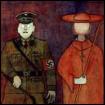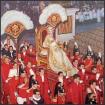 |
|
The Reichskonkordat was signed in Rome as the bells of St. Peter's rang out. Both sides saw themselves as the winners. And both sides were glad to be free of the independent, democratic Catholic Centre Party which had been dissolved during the negotiations. Now the German Catholics were being told it was their Christian duty to support Hitler.
|
 |
|
Here is the complete text: Concordat, Supplementary Protocol and Secret Supplement. Concordat article 27 provides for military chaplains if Germany broke the Versailles Treaty to re-arm, and the Secret Supplement exempted Catholic clergy from military service. The Secret Supplement does not appear in Church-approved translations, as it won't admit to knowing that Hitler was about to start a war. Articles 18 and 33 are "gag clauses" (Knebelartikel) which protect its financial and legal privileges forever (unless a miracle happens and it renounces them).
|
 |
|
Hitler's 1933 election posters boast of his alliance with the Catholic Church. This refutes the claims of Benedict XVI on his 2010 trip to Britain, that atheism helped the Nazis to power. Actually, it was his own church that filled that role. It appears that already in 1933 Hitler and the pope were conspiring to send the Germans off to war to fight their common enemy, Communism.
|
 |
|
|
 |
|
Franz Baron von Papen negotiated the concordat on behalf of Germany, even though he ahd been awarded the honourary title of papal chamberlain by Pius X in 1923. He faithfully served both Hitler and tthe pope, but escaped punishment at Nuremberg because his crimes were political.
|